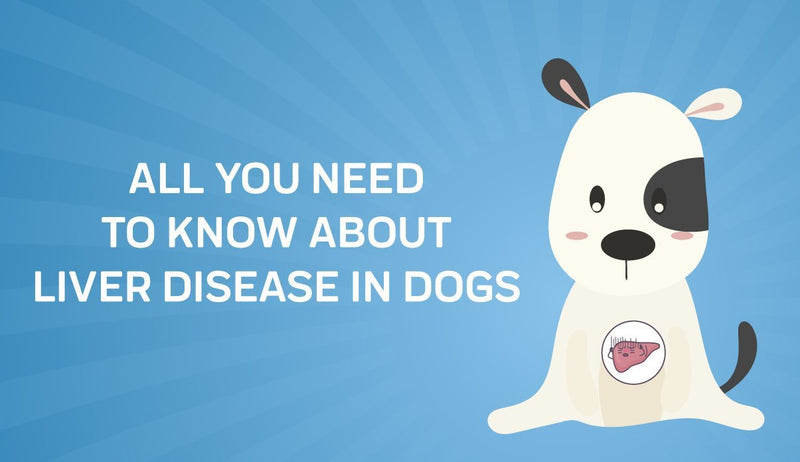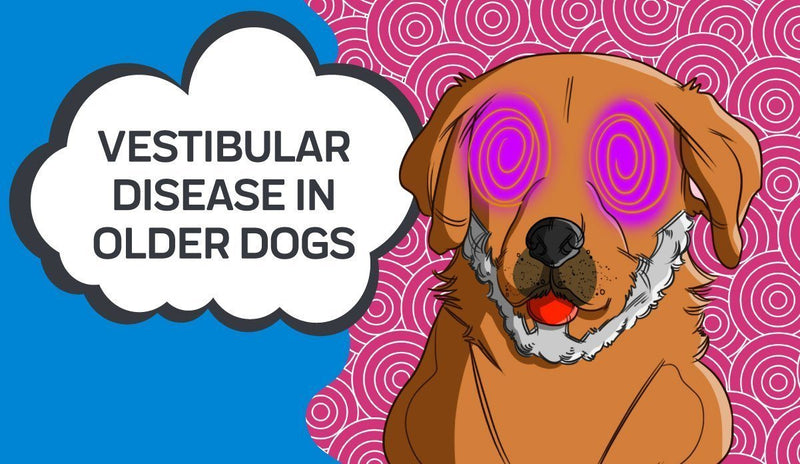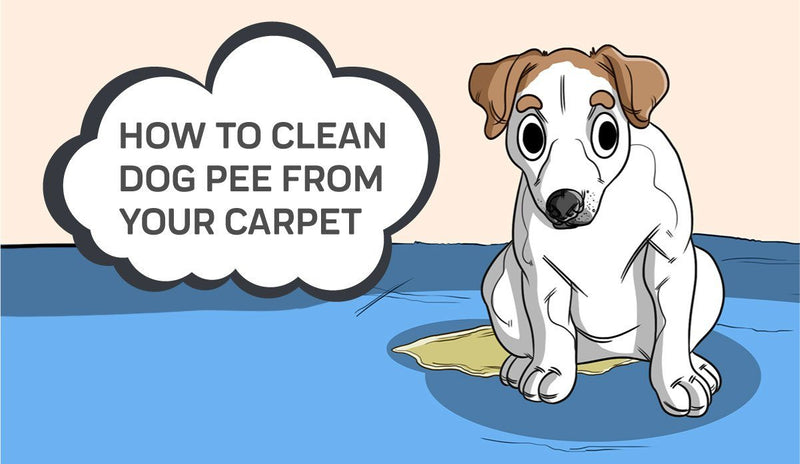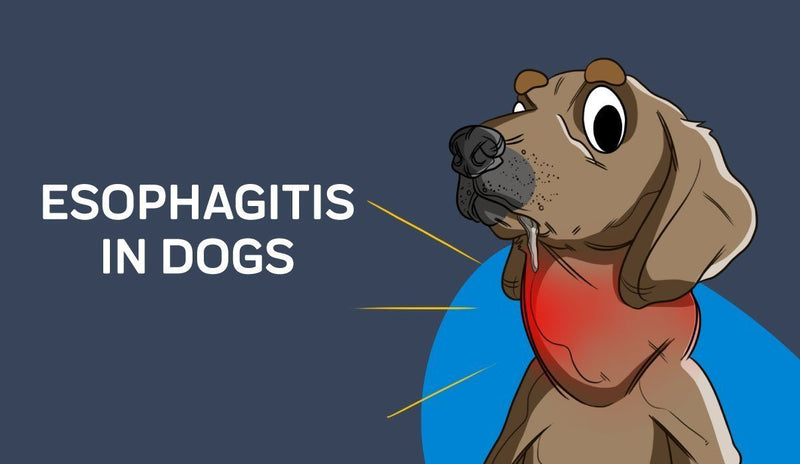- What Is Colitis In Dogs?
- Colitis Types
- Causes of Colitis In Dogs?
- Dog Colitis Symptoms
- Chronic Colitis Symptoms
- Diagnosing And Treating Colitis
- Natural Colitis Treatments
- CBD For Dog Colitis
- Colitis In Dogs: The Bottom Line

Having a deeper understanding of the kinds of illnesses that can occur in your dog, as well as their treatment options can help to assuage some of that fear. Here, we're going to take a look into colitis in dogs, and what you can do to help your dog to feel better.
What Is Colitis In Dogs?
Dog Colitis can also be known as “large bowel diarrhea”. It's typically a condition in which the colon or large intestine become inflamed. Typically, this can result in loose stools or diarrhea of various types in dogs.
Colitis Types
For the most part, there are three types of dogs colitis that your dog's can suffer from. These types are Acute, Chronic and Episodic. Each includes different frequencies of common causes that can help to point towards the type as well as the cause.
Acute colitis
Often, you'll notice that your dogs seems to be normal aside from straining to defecate or experiencing diarrhea. Typically, this type will resolve by itself without much human intervention. However, because of this the cause can sometimes go undiagnosed in dogs.
Some such irritants signs may include:
- Toxin ingestion
- Eating something unpleasant to dog's bodies
- Food intolerance
- Stress
- Consuming foreign bodies
- Dietary changes
- Internal parasites
Chronic
Unlike acute colitis, which can resolve rather quickly, chronic colitis can carry on for months or years. For this type of colitis, dog's can also include symptoms aside from diarrhea, pointing to a deeper condition that a dog may have.
Episodic
Episodic colitis in dogs can be seen as something in between acute and chronic colitis. However, unlike chronic colitis, it does typically resolve by itself and doesn't cause remaining effects in dogs.
Causes of Colitis In Dogs?
It's important to know the different things that can result in dogs colitis. Dog has colitis as they can vary depending on the kind of colitis your dog is experiencing.
These parasites signs may include:
Keep an eye on what your dog eats and drinks, and where it's coming from. For example, try bringing along a collapsible bowl when you're out and about rather than allowing your dog to drink from puddles or other natural, potentially infested, bacteria water sources.
Trauma
Trauma that can cause colitis in your dog may include physical trauma, consuming a foreign body, or eating something that doesn't agree with a dog's digestive tract.
Allergies

It can be tough to diagnose dog allergies efficiently. Both environmental and food allergies can result in colitis in your dog.
Furthermore, medication allergies can also result in colitis that is associated with antibiotics. If you notice a sudden bout of colitis, then consider any recent changes made to your dog food, water or medications.
Stress Diarrhea
Just like in humans, stress can also result in colitis for dogs. Things like travel, moving, guests or other changes in their home can result in stress and anxiety for dogs.
Disorders to consider may include:
- Inflammatory Bowel Disease ailments, including:
- Eosinophilic enterocolitis
- Neutrophilic enterocolitis
- Lymphocytic plasmacytic enterocolitis
- Granulomatous enteritis
- Histiocytic ulcerative colitis
It's worth keeping in mind that some dog breeds are prone to colitis stemming from Inflammatory Bowel Disease than others.
Furthermore, it's worth knowing that breeds like the German Shepherd can be more likely to develop Lymphocytic plasmacytic enterocolitis, while Boxers can be prone to Histiocytic ulcerative colitis.
Dog Colitis Symptoms
For the most part, the symptoms of colitis are much the same regardless of the type.
These symptoms include the following.
- Diarrhea with blood
- Straining or urgency to defecate
- Mucus in stool
- Small, frequent diarrhea bouts
Chronic Colitis Symptoms
On top of the other symptoms listed, there are a few that may show up in dog chronic colitis, but not other types.
Keep an eye out for the following symptoms:
- Appetite loss
- Lacking energy
- Increased time spent sleeping
- Poor coat quality
- Dehydration
- Weight loss
- Lethargy
- Overall body health appearing to decrease
Diagnosing And Treating Colitis
While in some cases the colitis may clear up relatively quickly, in other cases you may decide to seek out the help of a vet in order to determine what might be causing your dog's discomfort.
Once your vet has determined the cause, then they'll be able to come up with a course of action to get your dog back to their normal, happy selves.
There are a few tests your vet will have to enact in order to diagnose colitis.
These tests include:
- A profile for serum biochemistry
- A physical exam
- Urinalysis
- A complete blood count
In addition, a stool sample will allow the vet to determine whether or not parasites may be the cause.
Your vet may also want to get an X rays of the abdomen of your pet. This is a good way to check for masses, tumors or fecal impaction as well as other physical abnormalities that might be contributing to the issue.
Finally, if the vet still isn't able to get a clear ideal of what is happening, then a colonoscopy may be needed. This can allow for additional testing through the removal of certain tissues. It will also allow your vet to check of any irregularities that the other tests may have missed.
Treatment
Once the diagnosis of the colitis has been made, and the cause found, then treatment can begin. Because of this, an accurate diagnosis is key. When the cause isn't clear, treatment can include avoiding food for a day or two, then slowly beginning to provide them with a very bland diet.
This can help to determine what kind of food diet will work best for a given dog. In some cases, that might be a hypoallergenic one, while in other cases it might be a low-fiber food diet.
Furthermore, your vet may choose to prescribe:
- Anti-inflammatory medications
- Antimicrobial medications
- Immunosuppressive medications
Natural Colitis Treatments
There are a few treatment options out there that don't include medications that may help. These are worth trying, but keep in mind that they won't address all the causes when your dog has colitis.
Dog food/Diet Change
When your dog's food is to blame, changing it up can be very helpful. This might include ceasing in giving them any “human” food, changing to a raw diet if you choose, or sometimes seeking out a high-protein dog food.
Removing Stressors
If the culprit is stress colitis in dogs, then removing the stressor can go a long way to decreasing their stress and allowing them to feel better. Limiting things like noise, or keeping them away from areas that might be high-energy if you have guests may be helpful for your pet.
CBD For Dog Colitis
When it comes to acute or stress-based colitis, CBD can be a helpful way to relieve stress and keep them in a calmer state. Furthermore, it's great for relieving inflammation in the body, which can give your pet a little more comfort overall.
Colitis In Dogs: The Bottom Line
The stomach of your dog is a sensitive thing.
In many cases, it can simply be due to stress or the need for a diet change. It's always a good idea to get a diagnosis from a vet so that they can rule out any of the more serious causes. This is especially true if you notice the discomfort continues past just a couple of days from your pet.
The good news is that in the vast majority of cases, the prognosis for dogs suffering with causes of colitis is very good. As long as they get the correct treatment, the problem can be resolved in just days. Then your dog will be back to normal!
Sources:
Canine Lymphocytic-Plasmacytic Gastroenteritis
Approved by:
Dr. Ivana Vukasinovic
Doctor of Veterinary Medicine, University of Belgrade
 Ivana Vukasinovic grew up in Serbia and attended the University of Belgrade where she received a degree in Veterinary medicine in 2012 and later completed surgical residency working mostly with livestock. Her first year of practice was split between busy small animal practice and emergency clinic, and after two more years of treating many different species of animals, she opened her own veterinary pharmacy where an interest in canine and feline nutrition emerged with an accent on fighting animal obesity. In her free time, she acts as a foster parent for stray animals before their adoption, likes to read SF books and making salted caramel cookies.
Ivana Vukasinovic grew up in Serbia and attended the University of Belgrade where she received a degree in Veterinary medicine in 2012 and later completed surgical residency working mostly with livestock. Her first year of practice was split between busy small animal practice and emergency clinic, and after two more years of treating many different species of animals, she opened her own veterinary pharmacy where an interest in canine and feline nutrition emerged with an accent on fighting animal obesity. In her free time, she acts as a foster parent for stray animals before their adoption, likes to read SF books and making salted caramel cookies.
Thanks for stopping by!
P.S. We Love You!
Sincerely,
The Innovet Team
Please do not ask for emergency or specific medical questions about your pets in the comments. Innovet Pet Products is unable to provide you with specific medical advice or counseling. A detailed physical exam, patient history, and an established veterinarian are required to provide specific medical advice. If you are worried that your pet requires emergency attention or if you have specific medical questions related to your pet’s current or chronic health conditions, please contact or visit your local/preferred veterinarian, an animal-specific poison control hotline, or your local emergency veterinary care center.
Please share your experiences and stories, your opinions and feedback about this blog, or what you've learned that you'd like to share with others.
















